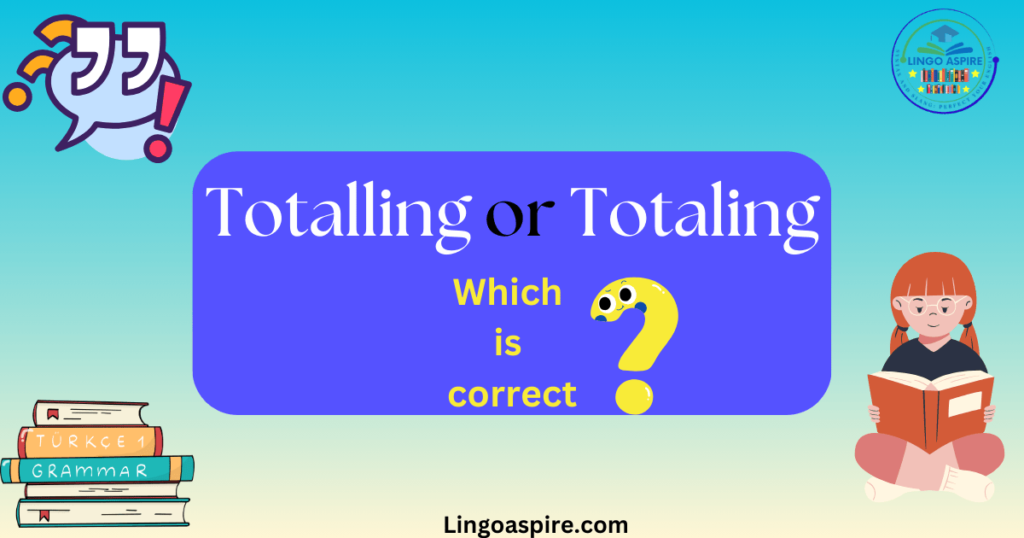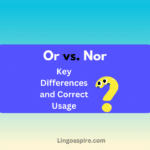When writing in English, one of the most common sources of confusion is deciding which spelling to use—totalling or totaling. While these two words are closely related in meaning, their spelling differs depending on the region in which they are used. Understanding when to use totalling and when to use totaling will not only help you follow the correct spelling rules but also enhance your writing by making it more precise and tailored to your audience. In this post, we’ll explore the meaning, differences, and usage of these two words and provide examples to help you make the right choice.
What Do “Totalling” and “Totaling” Mean?
Both totalling and totaling come from the verb “to total,” which means to sum up or calculate the final amount by adding things together. These terms are most commonly used in mathematics, accounting, or when discussing the calculation of sums. Whether you’re totalling the cost of your shopping or totaling your monthly expenses, you’re engaging in the act of adding up numbers to determine a final value.
While totalling and totaling have the same meaning, their spelling differs depending on the regional spelling preferences of British English and American English. In British English, the spelling with a double “l” (totalling) is preferred, whereas American English favors the spelling with a single “l” (totaling). Understanding this simple distinction will help you determine which spelling to use depending on where you are or who you are writing for.
In other words, if you’re writing for an audience in the UK, you would use “totalling,” while in the US, you would use “totaling.” But beyond this simple rule, the real challenge is knowing which spelling is right for your specific situation, especially when the meaning of both terms is exactly the same.
“Totalling” vs. “Totaling”: What’s the Difference?
At first glance, totalling and totaling may appear to be the same word, with only a slight spelling difference. However, understanding the regional differences in spelling conventions is essential when choosing which one to use.
British English: Totalling
In British English, the preferred form of the word is totalling. This is a result of the British tradition of retaining certain traditional spellings, which often involve using a double consonant in some words. For example, travelling is used in the UK, while traveling is preferred in the US. Similarly, totalling follows this British pattern of using a double “l” in verbs and adjectives when they are in their present participle form.
In British English, the spelling is consistent across various verb forms. For example, while you may totally sum up a number or totally calculate something, you would say that you are totalling up the cost of goods at a store or totalling your points in a game.
American English: Totaling
In American English, the spelling is totaling with a single “l.” This version of the word follows a general trend in US English to simplify certain spellings. The use of totaling follows the American tendency to omit double consonants when forming verbs and their derivatives. Thus, the form of the verb “total” remains with a single “l” in the present participle and other verb forms, like canceling versus cancelling or traveled versus travelled.
Regional Preferences
The key distinction between totalling and totaling lies in regional spelling preferences. It is important to note that both spellings are grammatically correct. Totalling is used in UK English, and totaling is used in US English, but the two are essentially interchangeable in meaning. Therefore, the spelling you choose depends on your audience and location.
| Region | Correct Spelling | Example |
|---|---|---|
| British English | Totalling | “I spent all morning totalling the costs.” |
| American English | Totaling | “I spent all morning totaling the costs.” |
Why Is There Confusion Between “Totalling” and “Totaling”?
The confusion between totalling and totaling arises because English spelling is not always straightforward. As with other spelling differences in English, such as colour versus color or favourite versus favorite, these variations are due to historical and regional differences. English language conventions differ between American and British versions, and in many cases, these differences are maintained in modern English usage.
For many learners of English or even fluent native speakers, these variations in spelling can be confusing. One might encounter both spellings in various texts, leading them to wonder if there’s an error or if they are missing some subtle distinction. However, it is simply a matter of geographical convention. In fact, when it comes to totalling and totaling, both spellings are correct—the only difference is where they are used.
When you’re writing in American English, it’s important to use totaling, and in British English, you should stick to totalling. The confusion usually stems from the fact that both forms are accepted in different contexts, making it easy to mix them up.
Synonyms for “Totalling” and “Totaling”
While totalling and totaling are the most common terms used for summing up amounts, there are also several synonyms and alternative phrases that convey a similar meaning. Depending on the context, you can use different words to express the idea of adding up or calculating a final sum.
Here are some alternative terms and phrases that can be used interchangeably with totalling or totaling:
| Synonym | Context | Example Sentence |
|---|---|---|
| Summing up | General usage | “I am summing up the expenses for today.” |
| Adding together | Casual or general conversation | “He is adding together the costs.” |
| Finalizing the total | Business or accounting contexts | “The accountant is finalizing the total.” |
| Compiling totals | Financial reporting or data analysis | “They are compiling totals from the sales.” |
| Calculating the sum | Mathematical or academic contexts | “She is calculating the sum of the numbers.” |
| Adding up the figures | Casual or business contexts | “We’re adding up the figures for the report.” |
These synonyms might be used depending on the tone, formality, or specificity of the situation. For instance, you might use “compiling totals” in a formal business setting or “summing up” in a more casual conversation. Each of these terms highlights the same underlying action of adding up numbers to reach a total, but the choice of words can convey different nuances based on context.
Using “Totalling” and “Totaling” in Sentences
Both totalling and totaling are used in similar contexts, but the spelling you choose depends on whether you’re following British English or American English conventions. Let’s look at how these words appear in real-world sentences:
Totalling (British English)
- “I spent hours totalling the receipts for the month.”
- “The teacher was busy totalling the exam scores.”
- “He is totalling up the number of items in his cart.”
Totaling (American English)
- “I spent hours totaling the receipts for the month.”
- “The teacher was busy totaling the exam scores.”
- “He is totaling up the number of items in his cart.”
As you can see, the sentences are exactly the same except for the spelling of the word. The action of summing up the numbers or determining a final value is identical. The key difference is simply in the spelling convention chosen—totalling for British speakers and totaling for American speakers.
The Importance of Regional Usage
When you’re writing in British English, it’s essential to use the correct spelling to maintain consistency with your chosen style. The same applies when writing in American English—stick to totaling to stay consistent with US spelling conventions. Mixing these two spellings in the same piece of writing can be distracting to your readers and may make your work seem less polished.
Totalling vs. Totaling: Which to Use and When?
Choosing between totalling and totaling comes down to one thing: your audience. If you’re writing for an audience in the US, totaling is the preferred spelling. If you’re writing for a British audience, totalling is the correct choice.
However, it is essential to be consistent throughout your writing. If you begin a piece using totalling, make sure to use it consistently throughout the text. The same applies to totaling—don’t switch between the two spellings within a single article or document.
| Region | Correct Spelling | Example |
|---|---|---|
| British English | Totalling | “I am totalling the total cost of the items.” |
| American English | Totaling | “I am totaling the total cost of the items.” |
What About Global Writing?
For a global audience, you might be unsure which spelling to use. In cases like this, it’s a good idea to follow a consistent style guide, especially if you are writing for an international platform. If the platform follows US English rules, use totaling; if it follows UK English rules, use totalling. However, if you are unsure, using one consistently (based on the intended audience) will keep your writing clear and professional.
Totals and Totalled: What’s the Difference?
Just like with totalling and totaling, the past tense forms of “total” can also be different based on regional preferences. In American English, the past tense and past participle of “total” is totaled with a single “l,” whereas in British English, it is totalled with a double “l.”
This follows the same pattern as many other verbs in English that have different forms in American and British usage, such as canceled (US) vs. cancelled (UK) or traveled (US) vs. travelled (UK). Both forms have the same meaning, but it’s important to use the appropriate one for the region in which you’re writing.
| Past Tense Form | American English | British English |
|---|---|---|
| Totaled | Correct | Incorrect |
| Totalled | Incorrect | Correct |
Conclusion: A Final Look at the Spelling Debate
To wrap things up, both totalling and totaling are correct, but their usage depends on your audience and regional spelling conventions. Totalling is used in British English, and totaling is used in American English. The main thing to remember is that consistency is key. Stick with the correct spelling throughout your writing, whether you’re following US English or UK English rules.
Being aware of regional spelling differences will not only help you communicate more effectively but also show that you respect the language and culture of your readers. So, the next time you’re calculating totals, remember to choose the right spelling based on where your audience is located.
Sources
Certainly! Here are three sources that discuss the spelling differences between totalling and totaling:
- Grammar Palette: This article explains the distinction between “totalling” and “totaling,” highlighting that “totalling” is the British English spelling, while “totaling” is the American English spelling.
- Grammar Cove: This source provides a clear explanation of the spelling differences, noting that “totalling” is preferred in British English and “totaling” in American English.
- Grammar Blend: This article discusses the regional spelling preferences, stating that “totalling” is used in British English, and “totaling” is preferred in American English.







